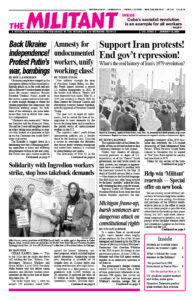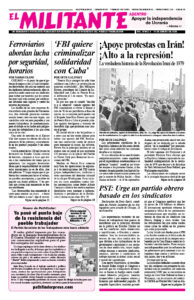Ukrainian people have stepped up the courageous defense of their homeland as fighting grinds on in the south and east and as Moscow’s bombardment of cities across the country continues. Russian President Vladimir Putin’s assault on the country’s power infrastructure seeks to create enough damage to freeze the civilian population into submission. But Ukrainian working people, the backbone of the resistance, are more determined than ever to defend their country’s independence.
“Ukraine is very resourceful,” Yevhenia Sontsova told the Financial Times. She and her 2-year-old daughter cheered on riders taking turns pedaling an exercise bike hooked to a generator to light up the big Christmas tree inside Kyiv’s main train station.
The Kremlin is bogged down in a debilitating war that is fomenting growing opposition at home and widening disagreements within its pro-war camp. But Putin’s war aims remain unaltered — to conquer Ukraine and subjugate its people. In his Dec. 31 New Year’s address to the nation, Putin referred to regions of eastern Ukraine seized by Moscow as home to “our people in our historical territories in the new regions of the Russian Federation.”
His regime aims to resurrect the czarist prison house of nations. Demanding the immediate and unconditional withdrawal of Moscow’s forces from all of Ukraine — including Crimea, Donetsk and Luhansk, seized by Russian forces in 2014 — is in the interests of working people here and around the world.
Ukraine’s air defenses are downing most missiles and drones but those that do strike targets cause severe damage. Maintenance workers are toiling around the clock to repair heating and power services and minimize blackouts. Hundreds of thousands of workers and others, including from the trade unions, work to provide everything from food and medicines to winter camouflage nets.
Workers with a minimum of arms training have joined the Territorial Defense Forces. They guard checkpoints and buildings, freeing up the army, also mainly volunteers, for the front. Other volunteers have formed fighting detachments that work with and strengthen the country’s forces. In contrast to conscripts who Putin uses as cannon fodder, the conviction by Ukrainian forces that they can win has deepened during the course of the war. Their strength and resilience has drawn admiration and solidarity from working people around the world.
Putin hopes backing for Kyiv weakens
The Kremlin hopes the ongoing costs of the war, from high energy prices to falling production will lead government leaders in Europe and political factions in Washington to call for an end to their aid to Ukraine. French President Emmanuel Macron urges Kyiv to talk with Moscow and prepare to make concessions. In contrast, Czech Foreign Minister Jan Lipavesky urged support for Kyiv to continue until Ukrainian sovereignty is fully restored.
Energy supplies to capitalist powers in Europe have been severely constricted by the Kremlin’s decision to cut gas supplies piped from Russia. Higher energy costs have led to cuts in steel and chemical production in Germany and elsewhere. Across much of the continent lights are dimmed and heating turned down.
But the German rulers have also built a liquefied-natural-gas terminal in breakneck speed to receive supplies from the U.S. and Qatar, as they end decades of depending on Moscow for energy sources. Dozens more terminals are slated to be built across Europe.
Rifts among Kremlin supporters
The disastrous course of Moscow’s invasion, especially since the September rout in the Kharkiv region and then the ignominious retreat from occupied Kherson, has deepened divisions over the conflict among Putin’s supporters.
Ukrainian missiles struck an ammunition store in a barracks housing newly conscripted troops in the Russian-controlled city of Makiivka in Donetsk Dec. 31. A massive explosion destroyed the complex.
“The number of dead and wounded runs into many hundreds,” said Igor Girkin, a former Russian commander of the separatist forces in the breakaway Donetsk region of Ukraine. He complained that ammunition should never have been stored in the same building that was accommodating troops. Lawmaker Sergei Mironov demanded the prosecution of Russian authorities responsible for such conditions.
In an unprecedented admission, Moscow said there were 63 deaths. Many senior officials in the Russian military and state apparatus hope for a way out of the conflict to cut Moscow’s losses, as do numerous capitalist profiteers, whose wealth has been slashed or jeopardized by the war.
Opposing them are forces demanding an escalation as the way out of the impasse. Yevgeny Prigozhin, leader of the Wagner mercenary group and Putin ally, calls for a much wider new levy of conscripts.
But Putin knows this is politically risky, as it could spark more opposition. Support for the war has already fallen, especially among relatives of conscripted soldiers and oppressed nationalities, who have been disproportionately sent to the front lines.
One obstacle to organizing working-class opposition in Russia to Putin’s invasion is the economic and financial embargo imposed on the country by the U.S. and other imperialist ruling classes in Europe. Putin uses these sanctions, which fall most harshly on working people, to try to shore up his support.
“Despite a universally pro-war message on Russia’s airwaves,” the Moscow Times notes, “and the passage of draconian wartime censorship laws,” many people across Russia have risked long jail sentences to express their opposition to the war. Almost 20,000 people were detained for anti-war protests in 2022.
Vladimir Ovchinnikov, an 84-year-old artist, painted memorials of prisoners in the Stalinist-era Gulag in Borovsk, a town 70 miles from Moscow. Now he paints anti-war murals. The authorities paint over them and have fined but not arrested him.
“How many more young people must be killed?” he asked the Moscow Times. “People in Russia used to say ‘peace to the world’ and ‘no to war’ but now such statements are punishable by law.”

